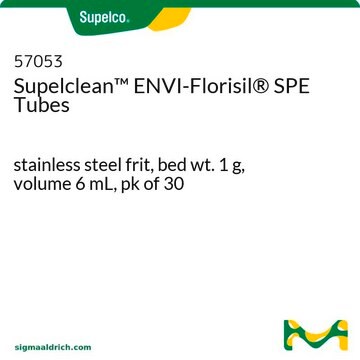55267-U
HybridSPE®-Phospholipid solid phase extraction (SPE) Cartridge
Cartridge, bed wt. 500 mg, volume 6 mL, pk of 30
Synonym(s):
HybridSPE (phospholipid and protein removal) 96-well plate, 15 mg
Sign Into View Organizational & Contract Pricing
All Photos(2)
About This Item
UNSPSC Code:
41115712
NACRES:
NB.21
Recommended Products
product name
HybridSPE®-Phospholipid, Cartridge, bed wt. 500 mg, volume 6 mL, pk of 30
material
PE frit (20/40 μm)
polypropylene hardware
Quality Level
product line
HybridSPE®
composition
bed wt., 500 mg
packaging
pk of 30
technique(s)
solid phase extraction (SPE): suitable
volume
6 mL
matrix active group
zirconia-based phase
Looking for similar products? Visit Product Comparison Guide
General description
HybridSPE-Phospholipid technology is a simple and generic sample prep platform designed for the gross level removal of endogenous protein and phospholipid interferences from biological plasma and serum prior to LC-MS or LC-MS/MS analysis. Biological plasma or serum is first subjected to protein precipitation via the addition and mixing of acidified acetonitrile. Precipitated proteins are then removed by centrifugation and the resulting supernatant is loaded on the HybridSPE-Phospholipid 96-well plate or cartridge which acts as a chemical filter that specifically targets the removal of endogenous sample phospholipids. The phospholipid retention mechanism is based on a highly selective Lewis acid-base interaction between the proprietary zirconia ions functionally bonded to the HybridSPE-Phospholipid stationary phase and the phosphate moiety consistent with all phospholipids. The resulting eluent is ready for immediate LC-MS or LC-MS-MS analysis.
The "In-well" and "In-cartridge" precipitation methods are available for the HybridSPE-Phospholipid 96-well version and HybridSPE-Phospholipid Ultra cartridge in which biological plasma/serum is first added to either the well or cartridge, followed by acidified acetonitrile (precipitation agent). After a brief mixing/vortexing step, vacuum is applied. Because the 96-well and Ultra cartridge versions contain a series of low porosity hydrophobic filters/frits, the packed-bed filter/frit assembly acts as a depth filter facilitating the concurrent removal of both phospholipids and precipitated proteins during the extraction process. Standard HybridSPE-Phospholipid cartridges require an "off-line" precipitation method.
The "In-well" and "In-cartridge" precipitation methods are available for the HybridSPE-Phospholipid 96-well version and HybridSPE-Phospholipid Ultra cartridge in which biological plasma/serum is first added to either the well or cartridge, followed by acidified acetonitrile (precipitation agent). After a brief mixing/vortexing step, vacuum is applied. Because the 96-well and Ultra cartridge versions contain a series of low porosity hydrophobic filters/frits, the packed-bed filter/frit assembly acts as a depth filter facilitating the concurrent removal of both phospholipids and precipitated proteins during the extraction process. Standard HybridSPE-Phospholipid cartridges require an "off-line" precipitation method.
Application
- Rapid analysis of 65 pharmaceuticals and 7 personal care products in plasma and whole-body tissue samples of fish using acidic extraction, zirconia-coated silica cleanup, and liquid chromatography-tandem mass spectrometry.: This study presents a method incorporating HybridSPE-Phospholipid for efficient cleanup in the analysis of various substances in biological matrices, showcasing its application in environmental toxicology (Tanoue et al., 2020).
- Multi LC-MS/MS and LC-HRMS Methods for Determination of 24 Mycotoxins including Major Phase I and II Biomarker Metabolites in Biological Matrices from Pigs and Broiler Chickens.: Demonstrates the use of HybridSPE-Phospholipid in multi-residue mycotoxin analysis, enhancing the detection capabilities in complex sample matrices (Lauwers et al., 2019).
- Liquid chromatography mass spectrometry determination of perfluoroalkyl acids in environmental solid extracts after phospholipid removal and on-line turbulent flow chromatography purification.: Explores the effectiveness of HybridSPE-Phospholipid in removing interfering substances from environmental samples, aiding in the accurate analysis of perfluoroalkyl substances (Mazzoni et al., 2016).
- Development and validation of a liquid chromatography-tandem mass spectrometry method for the quantitative determination of gamithromycin in animal plasma, lung tissue and pulmonary epithelial lining fluid.: Illustrates the adaptability of HybridSPE-Phospholipid in veterinary medicine for quantifying antibiotics, ensuring precision in therapeutic monitoring (De Baere et al., 2015).
Features and Benefits
- Merges the simplicity of protein precipitation and the selectivity of SPE via the targeted removal of phospholipids
- Reduce ion-suppression through the complete removal of phospholipids and precipitated proteins
- 2-3 step generic procedure
- Minimal to no method development
- Available in 96-well and 1 mL cartridge dimensions
Legal Information
HybridSPE is a registered trademark of Merck KGaA, Darmstadt, Germany
related product
Storage Class Code
11 - Combustible Solids
WGK
WGK 3
Flash Point(F)
Not applicable
Flash Point(C)
Not applicable
Choose from one of the most recent versions:
Already Own This Product?
Find documentation for the products that you have recently purchased in the Document Library.
Customers Also Viewed
Martina Rejtharová et al.
Food additives & contaminants. Part A, Chemistry, analysis, control, exposure & risk assessment, 34(4), 477-481 (2016-12-06)
Monitoring of steroid esters in blood serum is desirable in order to detect the possible illegal use of natural hormones as growth promoters. A method for the determination of testosterone propionate, testosterone benzoate, testosterone isocaproate, testosterone decanoate and estradiol benzoate
Development and validation of an HPLC-MS/MS method to determine clopidogrel in human plasma. Use of incurred samples to test back-conversion
Silvestro, L., et al.
Journal of Chromatography. B, Biomedical Applications, 878 (30), 3134-3142 (2010)
Solid-phase extraction of phosphorous-containing amino acid herbicides from biological specimens with a zirconia-coated silica cartridge
Watanabe, D., et al.
Journal of Chromatography. B, Biomedical Applications, 969, 69-76 (2014)
Quantitative determination of capecitabine and its six metabolites in human plasma using liquid chromatography coupled to electrospray tandem mass spectrometry
Deenen, M, et al.
Journal of Chromatography. B, Biomedical Applications, 913-914, 30-40 (2013)
Pankaj K Kanaujia et al.
Journal of chromatography. A, 1218(38), 6612-6620 (2011-08-25)
Selective extraction and enrichment of nerve agent degradation products has been achieved using zirconia based commercial solid-phase extraction cartridges. Target analytes were O-alkyl alkylphosphonic acids and alkylphosphonic acids, the environmental markers of nerve agents such as sarin, soman and VX.
Our team of scientists has experience in all areas of research including Life Science, Material Science, Chemical Synthesis, Chromatography, Analytical and many others.
Contact Technical Service












